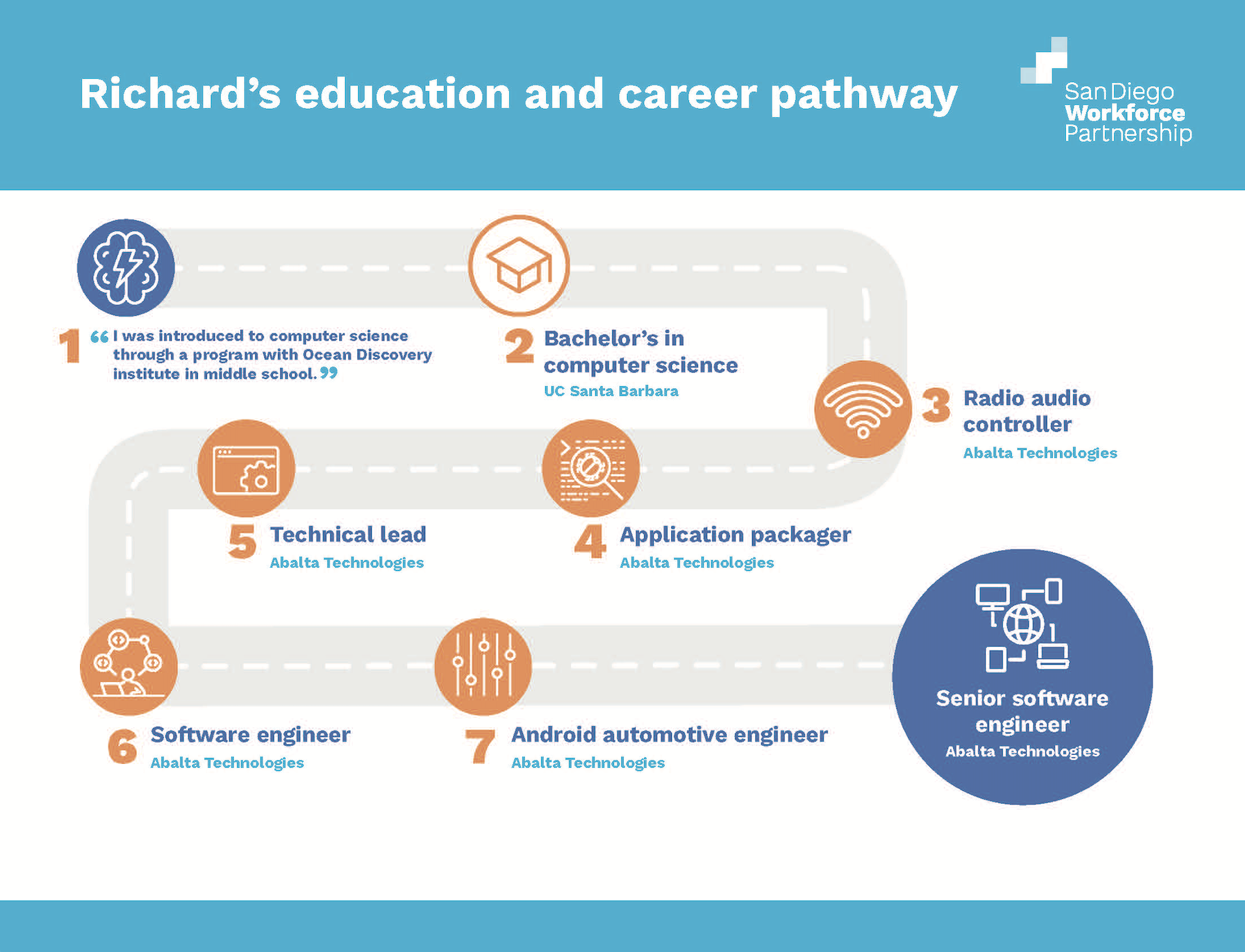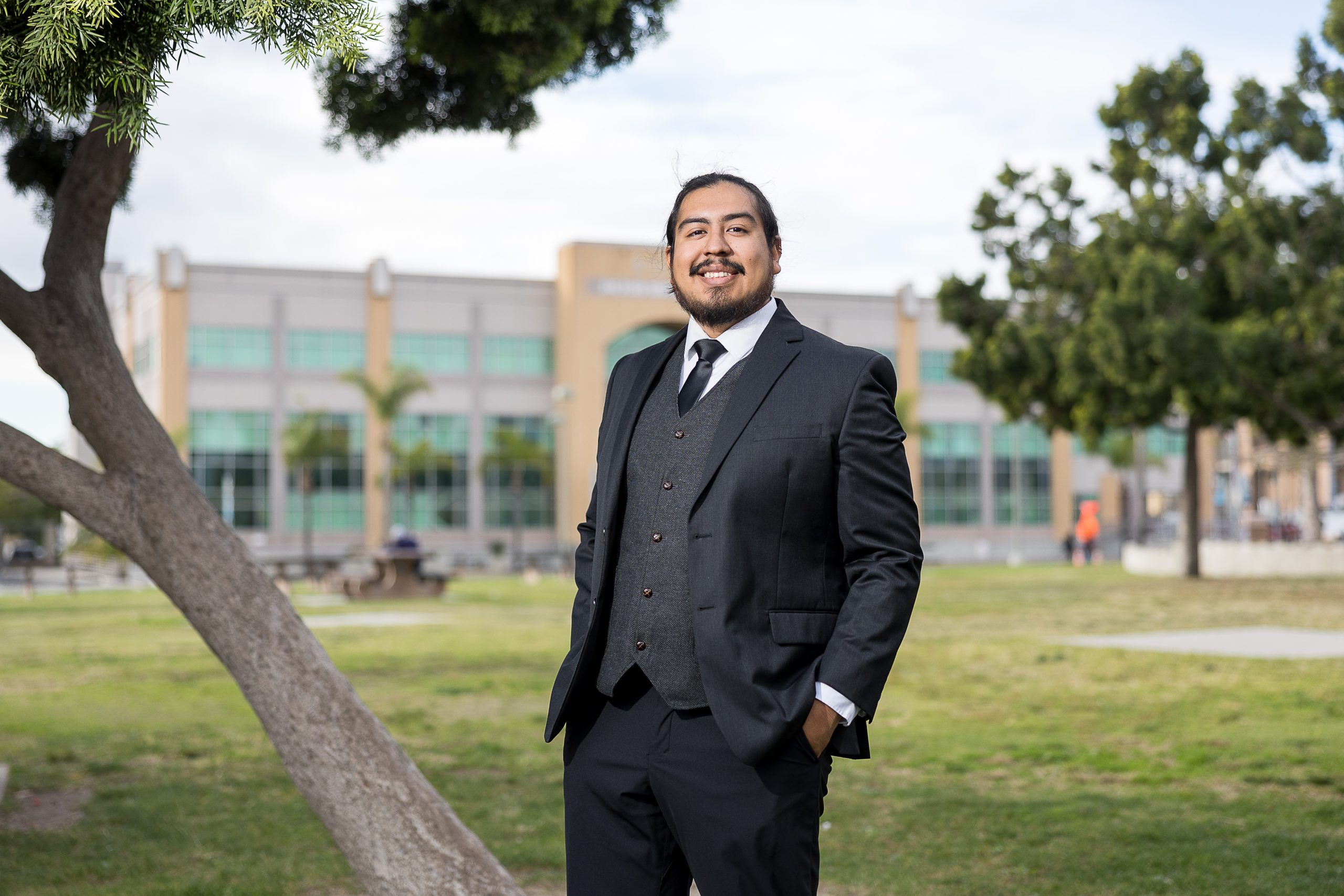Richard Alvarez
How did you get to where you are today? What was your training or education?
As a kid, I was always interested in science. In elementary school, I joined a school program called School in the Park that took us to museums in Balboa Park and introduced us to different science topics. I loved being able to see the animals and asking, “What do they do? Where do they live?” It was also cool to see the different technologies in the Science Center; I was amazed by the examples of science in the real world. I would come home from the museums and tell my parents everything I learned. When I went from elementary school to middle school, I joined a program at the Ocean Discovery Institute which taught me more about science by using the ocean as a medium. As part of this program, we went down to Mexico to do research on sea turtles. While down there, we also learned about college. We learned about different majors and the different science fields, and one of these lessons involved programming. For that lesson, our goal was to make a person walk across the screen. I ended up getting just their leg moving across the screen—that was both ridiculous and fun. That’s what got me interested in programming.
I continued this program all throughout high school and it engaged me with the community and science and convinced my family to help me pursue a scientific career. Once I graduated high school, I decided I would continue to pursue programming. I went on to get a bachelor’s degree from the University of California, Santa Barbara in computer science.

Describe your job. What are the most important skills you use in your work?
I am a senior software engineer at Abalta Technologies where I work on making software that operates inside of vehicles. An example of a project I’ve worked on is the Sirius XM Satellite Radio application. I have also worked on an application that detects when a vehicle gets hit and calls emergency services. One more example is software that alerts if your car leaves a certain area when it’s been valeted. Occasionally, we also develop mobile applications that let a user speak to their vehicle. An example is an app that lets you change your charging schedule on your hybrid vehicle through your phone.
In order to do my job successfully, there are two important skills depending on which portion of the job I’m doing. Programming is a huge one; if I want to get the technology made, proven out and developed, I need to know the programming languages that I’m working with so that I can make it happen. If I’m architecting and planning a project, then I just need to know the technology stack. That takes a different, broader view of the technology I’m working with. Another important skill is the ability to communicate. Communicating with my peers is fairly straightforward because we’re all technical people. But being able to communicate with our customers and our managers is equally important. This requires changing the level of technical speak that I use in order to make everybody understand the situation.
What does a typical week look like at your job?
I’ve worked at Abalta for a while, so I’ve had a different range of typical weeks. Currently, I’m an individual contributor on the research and development team. My week looks like talking to managers and different stakeholders to figure out what technology we want to work on, what we want to research and what we want to develop. Something I do often is create proofs of concept. This looks like working in various application forms, both mobile and embedded, to try to show that a piece of software can be done. Other times I’m developing software for a client and the work is pre-planned, which means I’m spending a large chunk of my day programming in various languages, typically Java. On occasion, customers will want me to answer their questions. In that case, I’m talking to customers, talking to the managers and estimating how long the work will take and how much it will cost to develop.

What do you love most about your job?
What I love most is the learning that’s involved with being a programmer. We get paid to solve problems that people haven’t encountered before, using solutions that we’ve seen in the past, putting together old pieces in new ways. That means that I’m constantly spending my day learning about new technologies and trying to understand the way problems work a little bit differently. I enjoy that it keeps me very active in terms of how I think.
What advice do you have for students thinking about working in engineering?
Many people in programming experience what’s called “imposter syndrome.” It’s the idea that when you get to a job, you’re not actually capable of doing that job. Many people have imposter syndrome when they first start working in programming because it’s very demanding. I would say that my family and my support network always encouraged me to keep going. Even if I wasn’t sure, even if I felt anxious about how well I could do something, having them around made sure that I was able to get through it. That has helped me a lot to deal with wondering whether I’d be able to work the job.
Find something that interests you and figure out how it works. Always stay curious and don’t be afraid to ask how something works, because there’s always more to learn. This is something that will always be there with you as you grow up.


